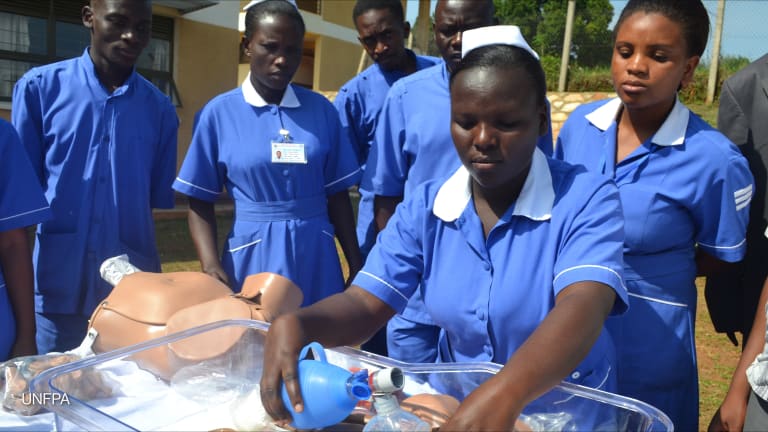
Ten years ago, World Bank borrowers had to read a hundred-page-long catalog, fill out layers of paperwork and seek out several signatures just to purchase reproductive health supplies.
But now they can go just buy directly from the U.N. Population Fund’s online store.
“It’s no different from you and I are seated at home to buy shoes on the Internet,” World Bank senior procurement specialist Maria Vannari told Devex. “What really triggered the change is technology … It is [also] a reaction to the practical difficulties we had on the ground.”
Online procurement may one day trigger a paperless revolution of sorts in working with multilateral groups, and already the bank is discussing with some United Nations agencies and other multilateral lenders how to make this purchase method a reality across the development world.
Simple, efficient system
Online procurement allows countries to place orders from UNFPA’s specialized portal, www.MyAccessRH.org.
“Countries don’t need to come back to the banks every single time they need to order a shipment,” Vannari said. “They don’t need to sign a new agreement every time they place an order. They sign up once for the whole project, for multiple shipments.”
The process is simple and straightforward: Select the products from a catalog, request a quote from UNFPA, confirm your order, transfer the funds, and then the U.N. agency handles everything from covering insurance to inspection and shipping.
UNFPA estimates that online procurement allows them to deliver within a lead time of five weeks after placing an order, rather than the average 29 weeks with the old system.
But cutting the time spent on navigating the maze of bureaucracy requires speedy re-stocking of quality supplies.
“If you have contraceptives, women need to take them regularly,” Vannari said. “If you have a gap because your particular type didn’t arrive, guess what happens?”
Open competition
Ultimately the success of the tool depends on whether borrowers will really use it or not, in open competition with other suppliers of RH products.
Vannari explained that borrowers — particularly in least-developed countries — can justify the need to source supplies from UNFPA to assure quality or when there is an emergency or re-stocking crisis.
The tool is still in its infancy, but the World Bank hopes it can change the way multilateral organizations do business with their partners. For now the number of UNFPA contracts under online procurement is still relatively small, and the bank is trying out the new system for a year to see how it plays out, while it is in talks with U.N agencies like the World Health Organization as well as the Inter-American Bank and AfDB to see if they would be interested in testing online procurement.
“The ball is on the very much in their court,” Vannari said. “If they can do it, we would be more than happy to respond and simplify the arrangements for any of these U.N. agencies.”
The other banks, she added, are very interested and already getting in touch with UNFPA.
“This is going to be even better for governments, because irrespective of the source of financing, the purchasing is exactly the same,” concluded Vannari.
Read more development aid news online, and subscribe to The Development Newswire to receive top international development headlines from the world’s leading donors, news sources and opinion leaders — emailed to you FREE every business day.








